The Best And Worst Technology Company Stocks In 2017
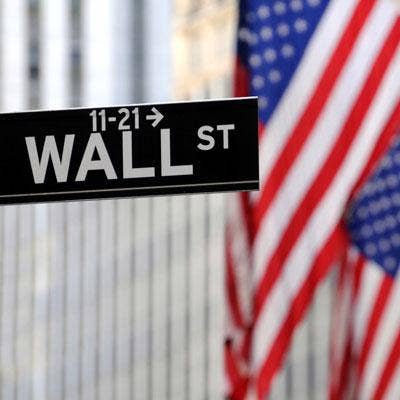
Tech Stocks: Stock Price Winners Outnumber Losers 3 To 1 In 2017
Stock markets were on an upward trajectory through much of 2017 with only intermittent pullbacks. For the year the Dow Jones Index was up a healthy 25.08 percent while the Nasdaq was up an impressive 28.24 percent.
And technology vendor stocks have been part of those gains. In 2017, 32 of the 42 publicly traded IT companies on our watch list recorded stock gains – 26 by double-digit percentages – while 10 suffered price declines.
Here's a look at who was up and who was down in 2017, starting with companies with the biggest gains in share price, based on stock closing prices on Dec. 30, 2016, and Dec. 29, 2017.

Red Hat
CEO: James Whitehurst
Dec. 30, 2016: $69.70
Dec. 29, 2017: $120.10
Change: +72.31%
It was a good year for open-source software vendor Red Hat – and its shareholders – as the company's stock recorded the most growth in 2017 among all the companies on our watch list. The vendor enjoyed increased demand for its flagship Linux operating system and JBoss middleware, as well as for the company's virtualization, cloud computing, hyper-converged infrastructure, storage and management software.
On Dec. 19 Red Hat reported that revenue in its fiscal 2018 third quarter (ended Nov. 30) was just under $748.0 million, up nearly 22 percent from $615.3 million in the same quarter one year earlier. Net income for the just-completed quarter was $101.3 million, up 49 percent from $67.9 million one year before.
Those results contributed to the $2.15 billion in revenue for the first three quarters of Red Hat's fiscal 2018, up 20 percent from $1.78 billion in the first three quarters of fiscal 2017. Net income for the three quarters totaled $271.4 million, up more than 44 percent from $187.9 million one year earlier.
During the year Red Hat acquired Codenvy, a provider of Agile and cloud-native development tools, and acquired the assets and technology of Permabit Technology, a developer of software for data de-duplication, compression and thin provisioning.
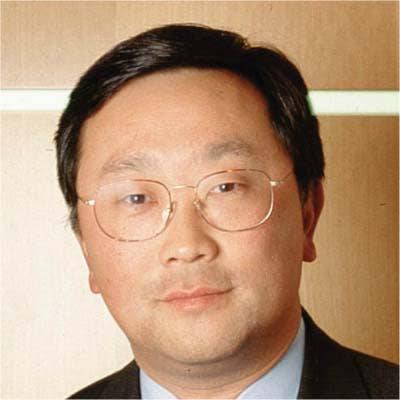
BlackBerry
CEO: John Chen
Dec. 30, 2016: $6.89
Dec. 29, 2017: $11.77
Change: +70.83%
On Dec. 20 BlackBerry reported that revenue in its fiscal 2018 third quarter (ended Nov. 30) was $226 million, down nearly 22 percent from $289 million in the same quarter one year earlier. And the company's loss for the quarter widened to $275 million from $117 million one year before.
For the first three quarters of fiscal 2018 BlackBerry reported revenue of $699 million, down nearly 32 percent from $1.02 billion in the first three quarters of fiscal 2017. But the company reported net income of $415 million compared with a $1.16 billion loss in the same time period one year before.
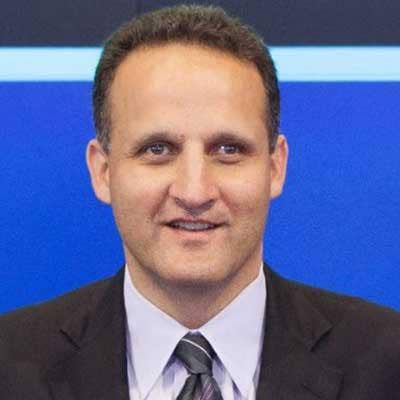
Tableau Software
CEO: Adam Selipsky
Dec. 30, 2016: $42.15
Dec. 29, 2017: $69.20
Change: +64.18%
Tableau is among the leaders – if not the de facto leader – among the new generation of business analytics software companies. For the first nine months of 2017 Tableau reported revenue of $627.7 million, up nearly 9 percent from $576.3 million in the first three quarters of 2016. But the company's loss for the three quarters widened more than 16 percent to $143.7 million from $123.4 million in the same period one year before.
Tableau acquired ClearGraph, a startup developer of natural language technology, on Aug. 9 and said it would integrate ClearGraph's technology into its core software. That will make it easier for people to interact with information by using conversational-style search to ask questions about data.

Splunk
CEO: Doug Merritt
Dec. 30, 2016: $51.15
Dec. 29, 2017: $82.84
Change: +61.96%
Splunk is a developer of real-time operational intelligence and machine-learning software used for security, IT performance management, business analytics and other applications, putting its technology squarely in the middle of some of the hottest segments of the IT industry.
For its fiscal 2018 third quarter (ended Oct. 31) Splunk reported revenue of $328.7 million, up 34 percent from $244.8 million in last year's third quarter. The company's loss for the quarter was $50.6 million, down from the $93.5 million loss reported one year before.
For the nine months ended Oct. 31 Splunk reported revenue of $851.1 million, up 32 percent from $643.5 million in the same period one year earlier. And the company's loss for the nine-month period shrank to $234.0 million from just under $281 million one year before.
At Splunk's .conf2017 annual customer and partner conference in September, the vendor debuted new releases of its software including Splunk Enterprise 7.0, Splunk IT Service Intelligence 3.0 and Splunk User Behavior Analytics 4.0 – all with new machine-learning capabilities.

VMware
CEO: Pat Gelsinger
Dec. 30, 2016: $78.73
Dec. 29, 2017: $125.32
Change: +59.18%
When Dell announced in 2015 its plan to acquire EMC, a cloud of uncertainty hung over VMware's future given that EMC owned a majority stake in the virtualization technology company. VMware's stock suffered a significant decline as a result.
But the company's stock price rebounded in 2016 and that momentum continued into 2017.
For its fiscal 2018 third quarter (ended Nov. 3) VMware reported revenue growth of more than 11 percent to $1.98 billion from $1.78 billion one year earlier. Net income for the quarter was $433 million, up nearly 39 percent from $319 million one year before.
Revenue for the first three quarters of fiscal 2018 reached $5.61 billion, up nearly 11 percent from $5.06 billion in the same period in fiscal 2017. Net income for the nine months surged 35 percent to $1.01 billion from $745 million in the same period one year earlier.
On Aug. 24 VMware announced the initial availability of its VMware Cloud software-defined data center on Amazon Web Services, allowing customers to run applications across vSphere-based public-, private- and hybrid-cloud environments.
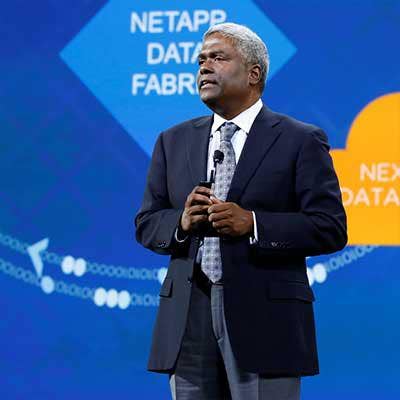
NetApp
CEO: George Kurian
Dec. 30, 2016: $35.27
Dec. 29, 2017: $55.32
Change: +56.85%
NetApp, a supplier of enterprise storage and data management products, is another IT vendor that was struggling a few years ago, but has rebounded strongly in the past two years. Part of the company's success has been the rapid expansion of its solid-state storage product portfolio.
On Nov. 15 NetApp reported that revenue in its fiscal 2018 second quarter (ended Oct. 27) grew 6 percent to $1.42 billion from $1.34 billion in the same quarter one year earlier. The $175 million in net income for the quarter represented a 6 percent gain over the $109 million in net income in the same quarter one year earlier.
For the six months ended Oct. 2,7 NetApp reported revenue of $2.75 billion, up 4 percent from $2.63 billion in the first half of fiscal 2017. Net income for the six-month period was $311 million, up nearly 80 percent from $173 million the year before.
On Aug. 16 NetApp said that it had acquired Greenqloud, a Reykjavik, Iceland-based developer of technology for enterprise-scale cloud management.
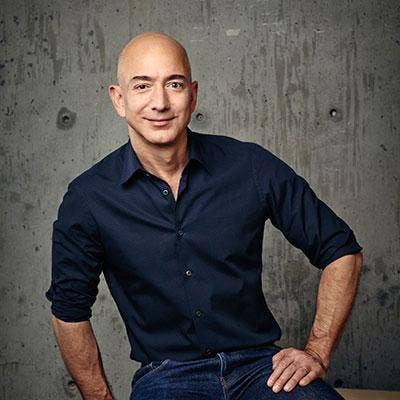
Amazon
CEO: Jeff Bezos
Dec. 30, 2016: $749.87
Dec. 29, 2017: $1,169.47
Change: +55.96%
Amazon has, in many ways, grown into one of the most powerful companies in the global economy, spanning many areas from online retail, to IT services, to consumer electronics and more. Just how much Amazon's presence has grown in so many areas was illustrated in August when the company completed its blockbuster $13.7 billion acquisition of grocery retailer Whole Foods.
On the IT side, Amazon Web Services has become the industry heavyweight for cloud services, approaching a $20 billion annual revenue run rate and generating sales that eclipse the next five cloud service providers combined.
In October Amazon reported that in the first nine months (ended Sept. 30) of 2017 the company recorded sales of $117.41 billion, up 27 percent from $92.25 billion in the first three quarters of 2016. But the company's net income for the three quarters was $1.18 billion, down 38 percent from $1.62 billion in the same period one year earlier.
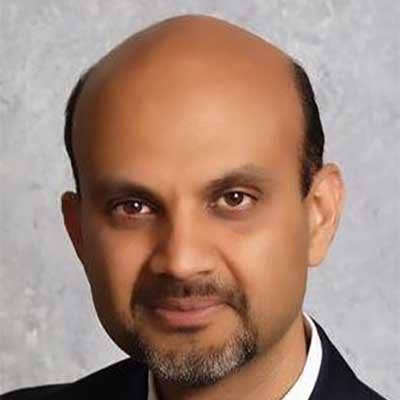
Carbonite
CEO: Mohamad Ali
Dec. 30, 2016: $16.40
Dec. 29, 2017: $25.10
Change: +53.05%
Carbonite, a developer of cloud-based data backup and recovery services, expanded its services portfolio into high-availability and data migration with the January acquisition of the Double-Take Software assets from Vision Solutions. That represented the second major acquisition for Carbonite, which bought EVault and its disaster recovery and business continuity services in December 2015.
The acquisitions accelerated Carbonite's evolution from a supplier of data backup for consumers to providing a range of data management and protection services for small and midsize businesses.
For its third quarter ended Sept. 30, Carbonite reported revenue of $61.6 million, up nearly 19 percent from $51.9 million in the third quarter of 2016. But the company reported a loss of $3.6 million for the quarter compared with net income of $107,000 in the same quarter one year earlier.
For the first nine months of 2017, Carbonite reported revenue of $177.8 million, up nearly 16 percent from $153.5 million in the first nine months of 2016. The company reported a loss of $2.4 million for the nine months compared with a $3.4 million loss in the same period one year earlier.

Salesforce.com
CEO: Marc Benioff
Dec. 30, 2016: $68.46
Dec. 29, 2017: $102.23
Change: +49.33%
CEO Marc Benioff has long vowed that Salesforce would be the first cloud software company to hit the $10 billion revenue threshold and the company is on the verge of achieving that goal in its fiscal 2018 that ends Jan. 31. The vendor, which recorded a $10 billion annual revenue run rate in its second and third quarters, is forecasting that sales for the fiscal year will be between $10.43 billion and $10.44 billion.
For the first nine months (ended Oct. 31) of fiscal 2018, Salesforce reported revenue of $7.63 billion, up 25 percent from $6.10 billion in the first nine months of fiscal 2017. But the company's $59.9 net income for the nine-month period was down markedly from the $231.1 million in net income the company recorded in the same period one year earlier.
Salesforce is forecasting that revenue in fiscal 2019 will reach $12.45 billion to $12.50 billion.
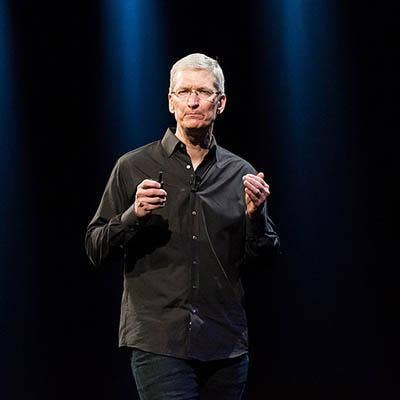
Apple
CEO: Tim Cook
Dec. 30, 2016: $115.82
Dec. 29, 2017: $169.23
Change: +46.11%
Apple had its ups and downs in 2017. Employees began moving into its new headquarters, a $5 billion futuristic building on a 175-acre campus. But the company also found itself caught up in several controversies, including a $15 billion tax dispute with the European Commission and a year-end kerfuffle over the company's efforts to slow down the performance of older iPhones to offset battery problems.
In what was probably the most significant new product event for Apple in several years, the company unveiled on Sept. 12 the iPhone X, a special edition of the company's flagship product, along with new iPhone 8 and iPhone 8 Plus editions.
For its fiscal 2017 ended Sept. 30, Apple reported sales of $229.23 billion, up more than 6 percent from $215.64 billion in fiscal 2016. Net income for the year was $48.35 billion, up nearly 6 percent from $45.69 billion one year before.

Fortinet
CEO: Ken Xie
Dec. 30, 2016: $30.12
Dec. 29, 2017: $43.69
Change: +45.05%
Security technology vendor Fortinet had a turbulent 2016, undertaking an extensive reorganization of its U.S. enterprise sales operations. But those changes, along with an expanded security product and service portfolio and popular subscription sales model, apparently paid off in 2017.
For the first nine months of 2017, Fortinet reported revenue of $1.08 billion, up 18 percent from $912.6 million in the first nine months of 2016. Net income for the period was $60.4 million, a huge gain from the $7.0 million net income in the same nine months one year earlier.
Fortinet will report its fourth quarter and full year 2017 financial results on Feb. 5.

HP Inc.
CEO: Dion Weisler
Dec. 30, 2016:$14.84
Dec. 29, 2017:$21.01
Change: +41.58%
HP Inc., a marketer of personal systems and printers, was created in November 2015 through the split of Hewlett-Packard Co. into HP Inc. and Hewlett Packard Enterprise.
On Nov. 1 HP completed its $1.05 billion acquisition of Samsung's printer business in a move that strengthened the vendor's competitive position in the $55 billion A3 copier replacement market.
For all of fiscal 2017 (ended Oct. 31), HP reported revenue of $52.06 billion, up 8 percent from $48.24 billion in fiscal 2016. Net earnings for the year were $2.53 billion, up 1.2 percent from just under $2.50 billion in fiscal 2016.
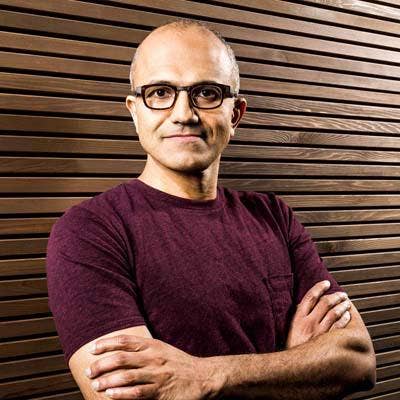
Microsoft
CEO: Satya Nadella
Dec. 30, 2016: $62.17
Dec. 29, 2017: $85.54
Change: +37.59%
For its Fiscal 2018 first quarter (ended Sept. 30,) Microsoft reported revenue of $24.54 billion, up 12 percent from $21.93 billion in the same quarter one year earlier. Net income grew 16 percent to $6.58 billion from $5.67 billion one year earlier.
Microsoft said that in the quarter the company exceeded $20 billion in annual recurring revenue, outpacing a goal set two years earlier.
In July Microsoft reported the results for all of fiscal 2017 ended June 30. Revenue grew 5.4 percent year over year to $89.95 billion from $85.32 billion in fiscal 2016. Net income for the year was $21.20 billion, up more than 26 percent from $16.80 billion the previous fiscal year.
Microsoft was active on the acquisition front in 2017. On June 8 Microsoft announced a deal to acquire cybersecurity startup Hexadite. On June 29 the company confirmed a long-rumored acquisition of Cloudyn, a developer of software used by businesses and managed service providers to manage their spending on cloud services.

Alphabet
CEO: Larry Page
Dec. 30, 2016: $771.82
Dec. 29, 2017: $1,046.4
Change: +35.58%
For the first nine months (ended Sept. 30) of 2017, Alphabet, parent company of Google, reported revenue of $78.53 billion, up 22 percent from $64.21 billion in the first nine months of 2016. Net income for the nine-month period was $15.68 billion, up nearly 11 percent from $14.15 billion in the same period one year earlier.
Those results included a payment of nearly $2.74 billion to the European Commission for a fine the EC levied against Google in June, charging that the internet giant abused its dominance of the search engine market to favor its own comparison shopping services over the competition. Google has appealed the fine, the largest in the history of the European Commission.
Alphabet is scheduled to announce its fourth quarter and 2017 full-year financial results on Feb. 1.
On Sept. 26 Google said that it had acquired identity management startup Bitium, bringing in security technology that can be used to secure applications running in Google's cloud system.

Nutanix
CEO: Dheeraj Pandey
Dec. 30, 2016:$26.56
Dec. 29, 2017:$35.28
Change: +32.83%
The stock for hyper-converged software developer Nutanix plummeted more than 37 percent in March – with the share price falling from $31.12 at the close of trading March 2 to $23.00 at the close of trading March 3. That came after the company issued guidance for the third quarter that disappointed investors and analysts. The stock continued to decline until bottoming out at $14.46 per share on May 1.
But the share price rebounded in May and June and continued to strengthen through the rest of the year.
In June Nutanix struck a technology alliance with Google, including gaining Nutanix's support for Google's Kubernetes container technology, which makes it easier to move Nutanix-based infrastructure workloads to Google clouds – a move that establishes a bridge between on-premises and cloud systems.
For its fiscal 2018 first quarter (ended Oct. 31), Nutanix reported revenue of $275.6 million, up 46 percent from $188.6 million in the first quarter of fiscal 2017. The company reported a loss of $61.5 million in the most recent quarter compared with a $140.3 million loss one year earlier.
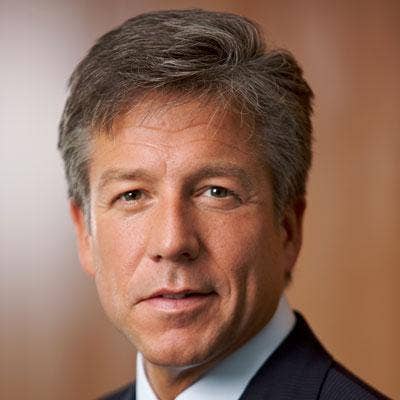
SAP
CEO: Bill McDermott
Dec. 30, 2016: $86.43
Dec. 29, 2017: $112.36
Change: +30.00%
SAP's focus in 2017 was on continued sales growth for its flagship HANA database platform and S/4HANA application suite, along with accelerating sales of newer products such as its Leonardo "digital innovation" system. Sales of the company's cloud-based offerings continued to grow in 2017.
For the first nine months of 2017, SAP reported total revenue of 16.66 billion euros (U.S. $20.10 billion), up 8.6 percent from 15.34 billion euros (U.S. $18.51billion) in the first nine months of 2016. After-tax profit for the first nine months of 2017 was 2.19 billion euros (U.S. $2.64 billion) up nearly 4 percent from 2.11 billion euros (U.S. $2.55 billion) one year earlier.
SAP will release its financial results for the fourth quarter and for all of 2017 on Jan. 30.
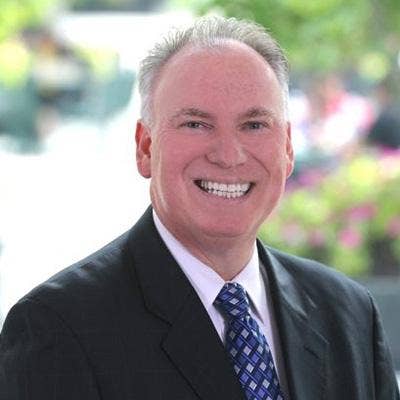
Xerox
CEO: Jeff Jacobson
Dec. 30, 2016:$22.61
Dec. 29, 2017:$29.15
Change: +28.93%
Xerox split into two companies effective Jan. 2, 2017, one named Xerox focused on printers and other document technology hardware with expected annual sales of $11 billion, and the other named Conduent providing business process outsourcing services with expected annual sales of $7 billion.
For the first nine months of 2017, Xerox reported revenue of $7.52 billion, down 6.5 percent from $8.04 billion in the first nine months of 2016. Net income for the nine months in 2017 was up more than 3 percent to $385 million from $372 million in 2016.
At the end of the year Xerox came under pressure from activist investor Carl Icahn, who owns a 9 percent stake in the company and nominated his own candidates to its board of directors, to make changes to improve the company's performance. Icahn even called for the removal of Xerox CEO Jeff Jacobson.
Xerox implemented a pair of stock splits in 2017, including a 1,518-for-1,000 stock split on Jan. 3 and a 1-for-4 reverse stock split on June 15. The stock prices in this analysis have been adjusted accordingly.
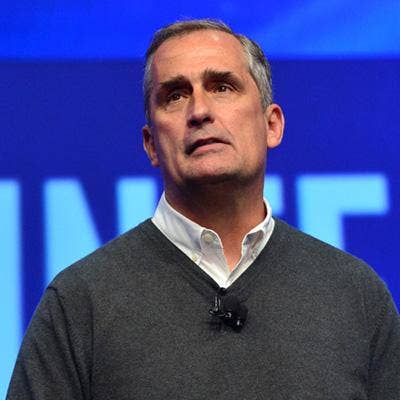
Intel
CEO: Brian Krzanich
Dec. 30, 2016: $36.30
Dec. 29, 2017: $46.16
Change: +27.16%
Intel debuted a steady stream of next-generation processors throughout 2017, including its Core i9 X-series of desktop processors and the Skylake Purley Xeon server processors. But the company faced increased competition from rival AMD with its Epyc and Ryzen processor lines.
On Aug. 8 Intel completed its $15.3 billion acquisition of Mobileye, a manufacturer of chip-based camera systems for connected cars. The move, part of Intel's efforts to expand beyond chips for desktop and laptop PCs into new areas such as the Internet of Things and artificial intelligence, makes Intel a major player in the market for components for automated vehicle systems.
For the first nine months of 2017, Intel reported revenue of $45.71 billion, up more than 6 percent from $43.01 billion in the first nine months of 2016. Net income for the nine-month period in 2017 surged more than 52 percent to $10.29 billion from $6.75 billion in the same period one year earlier.
In the first week of January, Intel was rocked by the news that its processors contained the Meltdown and Spectre exploits, news that sent the company's stock down more than 9 percent between Jan. 2 and Jan. 1o. That decline was after the end of the period covered in this analysis of 2017 stock prices.

Cisco Systems
CEO: Chuck Robbins
Dec. 30, 2016: $30.22
Dec. 29, 2017: $38.3
Change: +26.74%
In 2017 Cisco continued its efforts to evolve from a manufacturer of networking hardware to a supplier of data center software and services.
That effort was also the driver behind a number of significant Cisco acquisitions during the year, including its $3.7 billion buy of AppDynamics, a developer of cloud application performance monitoring and management tools; the acquisition of SD-WAN technology company Viptela; and hyper-converged software developer Springpath.
But there were bumps in the road in 2017, including the vendor's declining share of the networking technology market and an episode early in the year where multiple Cisco product lines were impacted by a faulty clock signal component.
For all of fiscal 2017 (ended July 29), Cisco reported revenue of $48.01 billion, down 2.5 percent from $49.25 billion in fiscal 2016. Net income in fiscal 2017 was $9.61 billion, down 10.5 percent from $10.74 billion in fiscal 2016.
For its fiscal 2018 first quarter (ended Oct. 28), Cisco reported revenue of $12.14 billion, down 2 percent from $12.35 billion in the first quarter of fiscal 2017. Net income was $2.39 billion, up 3 percent from $2.32 billion one year earlier.
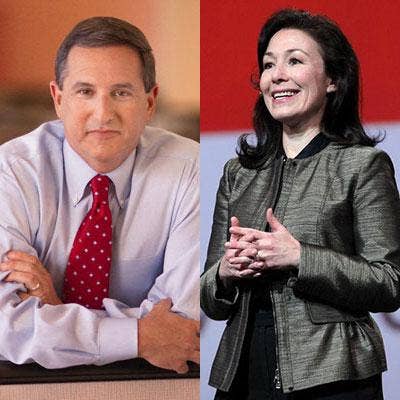
Oracle
Co-CEOs: Mark Hurd and Safra Catz
Dec. 30, 2016: $38.45
Dec. 29, 2017: $47.28
Change: +22.96%
Oracle, which has generally been very active on the acquisition front, was relatively quiet in 2017. The IT giant made only four acquisitions, the largest its $1.19 billion buy of Aconex, a developer of construction project management applications. The company appeared instead to focus in 2017 on leveraging the NetSuite application portfolio following Oracle's $9.3 billion acquisition of that company in November 2016.
Oracle reported that revenue in the first six months (ended Nov. 30) of fiscal 2018 reached $18.81 billion, up 7 percent from $17.63 billion in the first six months of fiscal 2017. Net income for the six months reached $4.44 billion, up 15 percent from $3.86 billion in the same period one year before.
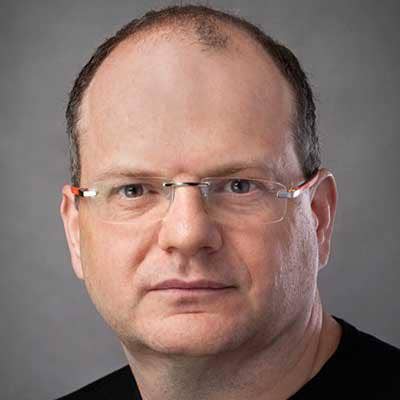
Check Point Software Technologies
CEO: Gil Shwed
Dec. 30, 2016: $84.46
Dec. 29, 2017: $103.62
Change: +22.69%
On Aug. 11 Check Point Software Technologies announced an extension to its ongoing share repurchase program, authorizing the repurchase of up to $250 million of ordinary shares each quarter up to an aggregate of $1 billion. Between April 1, 2016, and June 30, 2017, the company purchased about 14 million shares for approximately $1.2 billion. As of June 30, 2017 the company had about 162.8 million shares outstanding.
For the first nine months (ended Sept. 30) of 2017, Check Point reported that revenue increased 7.5 percent to $1.35 billion from $1.25 billion in the first nine months of 2016. Net income for the period grew 12 percent to $563.6 million from $502.9 million in the same period one year earlier.

FireEye
CEO: Kevin Mandia
Dec. 30, 2016:$11.90
Dec. 29, 2017:$14.20
Change: +19.33%
FireEye's stock had been on a long decline – dropping nearly 43 percent in 2016 – before starting a rebound late in this year's first quarter. FireEye has also been the subject of ongoing acquisition rumors and has seen the departure of several high-level executives.
In September FireEye launched its long-awaited endpoint security software.
For the first nine months (ended Sept. 30) of 2017, FireEye reported revenue of $548.8 million, up 3.7 percent from $529.4 million in the same period one year earlier. For the nine months FireEye reported a loss of $226.7 million, an improvement from a $418.6 million loss in the first nine months of 2016.
The company will announce its 2017 fourth quarter and full-year results on Feb. 8.
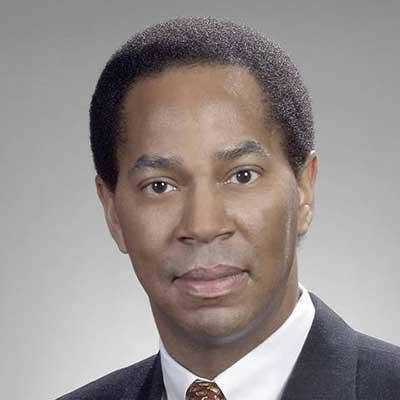
Eaton
CEO: Craig Arnold
Dec. 30, 2016: $67.09
Dec. 29, 2017: $79.01
Change: +17.77%
Power management technology vendor Eaton reported that sales for the first nine months (ended Sept. 30) of 2017 reached $15.19 billion, up 2 percent from $14.88 billion in the first nine months of 2016. Net income for the period was $2.35 billion, up more than 65 percent from $1.42 billion in the same period one year before.

Symantec
CEO: Greg Clark
Dec. 30, 2016: $23.89
Dec. 29, 2017: $28.06
Change: +17.46%
Symantec has been through some major changes, including selling off its Veritas storage technology business in 2015 and buying security software developer Blue Coat Systems for $4.65 billion in August 2016. The latter resulted in significant changes in Symantec's executive ranks with Blue Coat executives assuming many of the top management posts.
In February Symantec completed its $2.3 billion acquisition of LifeLock, a provider of identity theft protection services, expanding Symantec's consumer offerings.
In July Symantec announced deals to acquire Fireglass, a developer of agentless isolation technology, and Skycure, a developer of threat defense software for mobile devices. And in November the company acquired SurfEasy, a leading virtual private network provider.
For the first two quarters (ended Sept. 29) of fiscal 2018, Symantec reported revenue of $2.42 billion, up nearly 30 percent from $1.86 billion in the first half of fiscal 2017. But the company reported a loss of $145 million for the first two quarters of fiscal 2018 compared with a $9 million loss in the same period one year before.

Western Digital Corp.
CEO: Steve Milligan
Dec. 30, 2016:$67.95
Dec. 29, 2017: 79.53
Change: +17.04%
In December Western Digital Corp. reached a settlement with Toshiba Memory Corp. to resolve a months-long dispute over the latter's plans to sell its $18 billion chip business unit. Western Digital had maintained that Toshiba needed its permission to sell the business: That stemmed from a joint venture Toshiba had with SanDisk, which Western Digital acquired in 2016 for $16 billion.
For the fiscal 2018 first quarter (ended Sept. 29), Western Digital reported revenue of $5.18 billion, up nearly 10 percent from $4.71 billion in the same quarter one year earlier. The company reported net income of $681 million for the most recent quarter compared with a $366 million loss one year before.
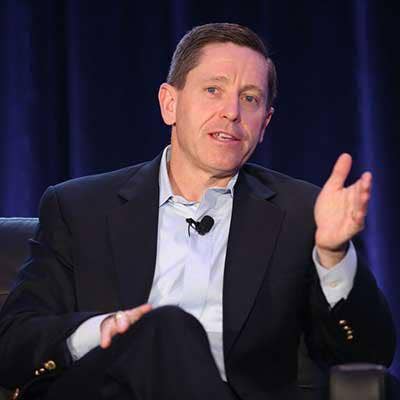
Palo Alto Networks
CEO: Mark McLaughlin
Dec. 30, 2016: $125.05
Dec. 29, 2017: $144.94
Change: +15.91%
In February security technology vendor Palo Alto Networks acquired LightCyber, a developer of behavioral analytics software for $105 million.
After disappointing sales results in its fiscal 2017 second quarter (ended Jan. 31), which the company blamed on problems with its go-to-market strategies, Palo Alto Networks launched a comprehensive sales reorganization. The move appeared to succeed as sales growth through the rest of calendar 2017 was in line with investor expectations.
For its fiscal 2018 first quarter (ended Oct. 31), Palo Alto Networks reported revenue of $505.5 million, up 27 percent from $398.1 million in the first quarter of fiscal 2017. The company reported a loss of $64.0 million in the first quarter compared with a $56.9 million loss one year before.
For all of fiscal 2018 the company expects revenue in the range of $2.145 billion to $2.185 billion, representing year-over-year growth of 22 percent to 24 percent.

Seagate Technology
CEO: Dave Mosley
Dec. 30, 2016:$38.17
Dec. 29, 2017: $41.84
Change: +9.61%
On July 25 Seagate Technology announced a leadership transition plan under which president and chief operating officer Dave Mosley became CEO effective Oct. 1 while CEO Steve Luczo would become executive chairman and "focus on longer-term shareholder value creation."
For the company's fiscal 2018 first quarter (ended Sept. 29), Seagate reported revenue of $2.63 billion, down nearly 6 percent from $2.80 billion in the first quarter of fiscal 2017. Net income for the quarter, however, grew more than 8 percent to $181 million from $167 million one year earlier.
For all of fiscal 2017 (ended June 30), Seagate reported revenue of $10.77 billion, down 3.5 percent from $11.16 billion in fiscal 2016. But net income for the year soared to $772 million compared with the $248 million net income recorded in fiscal 2016.

Netgear
CEO: Patrick Lo
Dec. 30, 2016: $54.35
Dec. 29, 2017: $58.75
Change: +8.10%
For its third quarter ended Oct. 1, Netgear reported revenue of $355.5 million, up 5 percent from $338.5 million in the third quarter of 2016. But net income for the quarter was down 1.5 percent year over year to $20.8 million from $21.1 million one year earlier.
For the first three quarters (ended Oct. 1) of fiscal 2017, Netgear reported sales of $1.01 billion, up 5 percent from $960.4 million in the first three quarters of fiscal 2016. But net income for the first three quarters was down more than 4 percent to $51.4 million from $53.7 million one year before.

CA Technologies
CEO: Michael Gregoire
Dec. 30, 2016: $31.77
Dec. 29, 2017: $33.28
Change: +4.75%
CA Technologies has been reinventing itself with a focus on systems and cloud management, security and DevOps software. In 2017 it increased its focus on DevSecOps, connecting security to its DevOps product portfolio.
Fueling that effort was CA's April acquisition of Veracode, a developer of application security technology, for $614 million.
For its fiscal 2018 second quarter (ended Sept. 30), CA reported revenue of $1.03 billion, up 2 percent from $1.02 billion in the same quarter one year earlier. Net income for the quarter was $184 million, down 13 percent from $212 million one year before.
For the first six months (also ended Sept. 30) of fiscal 2018 CA reported revenue of $2.06 billion, up 2 percent from $2.02 billion in the first half of fiscal 2017. But net income for the first six months of fiscal 2018 was down more than 11 percent year-over-year to $363 million from $410 million.

Commvault Systems
CEO: N. Robert Hammer
Dec. 30, 2016: $51.40
Dec. 29, 2017: $52.50
Change: +2.14%
Commvault Systems is a developer of enterprise data protection and information management systems for data backup, archiving and recovery.
For the first six months (ended Sept. 30) of fiscal 2018, Commvault reported revenue of $334.1 million, up more than 7 percent from $311.2 million in the first half of fiscal 2017. The company reported a loss of $1.3 million for the first six months of fiscal 2018, an improvement from the $2.7 million loss in the same period one year earlier.

Brocade Communications Systems
CEO: Lloyd Carney
Dec. 30, 2016: $12.49
Dec. 29, 2017: $12.73
Change: +1.92%
After more than a year in limbo, networking technology supplier Brocade Communications Systems was acquired by semiconductor maker Broadcom for $5.9 billion ($12.75 per share) on Nov. 17. The companies announced the deal in November 2016 and originally expected to complete it by Aug. 30, but it was held up regulatory approvals.
As part of the plan, a number of Brocade's businesses were sold off both before and after the acquisition was completed. Brocade's IP networking operations – including the Ruckus Wireless business Brocade bought in 2016 for $1.2 billion – was sold to Arris International for $800 million, for example, while Extreme Networks bought Brocade's data center networking business.
Broadcom retained Brocade's Fibre Channel SAN switching business.

Juniper Networks
CEO: Rami Rahim
Dec. 30, 2016: $28.26
Dec. 29, 2017: $28.50
Change: +0.85%
On Aug. 31 Juniper Networks unveiled a deal to acquire security analytics software developer Cyphort in a move that will boost the vendor's security technology portfolio.
In July Juniper Networks hired Bikash Koley, one of Google's top engineers, as its new chief technology officer.
For the first nine months (ended Sept. 30) of 2017, Juniper reported revenue of $3.79 billion, up 5 percent from $3.60 billion in the first nine months of 2016. Net income for the period in 2017 was up 12.5 percent to $454.3 million from $403.8 million one year before.
Juniper will announce the results for its 2017 fourth quarter and fiscal year on Jan. 30.
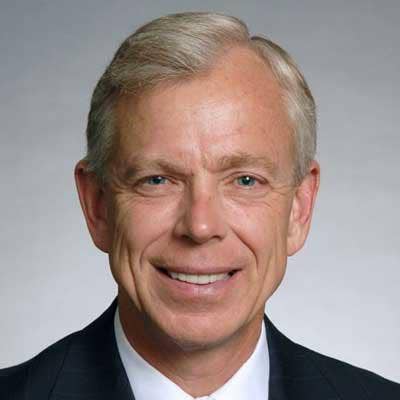
Verizon Communications
CEO: Lowell McAdam
Dec. 30, 2016: $53.38
Dec. 29, 2017: $52.93
Change: -0.84%
Verizon Communications is the first company on our watch list whose stock recorded a decline in 2017.
In May Verizon beat out rival AT&T in a bidding war for wireless spectrum holder Straight Path, acquiring the company for $3.1 billion in May.
In June Verizon finally closed its long-pending acquisition of Yahoo for $4.48 billion in a move to expand its content offerings.
For the first nine months (ended Sept. 30) of 2017, Verizon reported operating revenue of $92.08 billion, down 1.7 percent from $93.64 billion in the same period of 2016. Net income for the first nine months of 2017 was $11.77 billion, up more than 30 percent from $9.01 billion in the same period in 2016.

Citrix Systems
CEO: David Henshall
Dec. 30, 2016: $89.31
Dec. 29, 2017: $88.00
Change: -1.47%
On July 10 Citrix announced that Kirill Tatarinov was out as president and CEO, a job he had held since January 2016. No reason for his departure was given other than it was by mutual agreement between Tatarinov and the company's board. CFO and chief operating officer David Henshall was named the company's new president and CEO.
The company's statement announced the leadership transition as a bid to "accelerate cloud transformation, enhance profitability and return capital to shareholders." Along those lines, on Nov. 13 the company's board authorized the repurchase of an additional $1.7 billion of Citrix stock, bringing its total repurchase authorization to more than $2 billion through the end of 2018.
On Sept. 21 Citrix appointed former SAP executive Mark Ferrer to be the company's chief revenue officer and executive vice president.
For the first nine months (ended Sep. 30) of 2017, Citrix reported revenue of $2.05 billion, up 2 percent from $2.00 billion in the first nine months of 2016. Net income for the nine-month period was $263.2 million, down nearly 22 percent from $336.3 million in the same period one year before.

Lenovo Group
CEO: Yang Yuanqing
Dec. 30, 2016:$12.00
Dec. 29, 2017:$11.24
Change: -6.33%
Lenovo has struggled to gain traction in the market for servers and other data center systems even as it loses market share to rivals HP Inc. and Dell in its core PC and laptop computer business.
In the third calendar quarter of 2017, Lenovo held a 5.1 percent share of the worldwide server market, according to IDC, down from 7 percent one year earlier. And in the same quarter the company fell to No. 4 in the U.S. PC market behind HP Inc., Dell and Apple, according to Gartner.
For the first two quarters (ended Sept. 30) of fiscal 2018, Lenovo reported revenue of $21.77 billion, up 2 percent from $21.29 billion in the first half of fiscal 2017. But net income for the six-month period in 2018 was $67 million, down 80 percent year over year from $330 million in 2016.
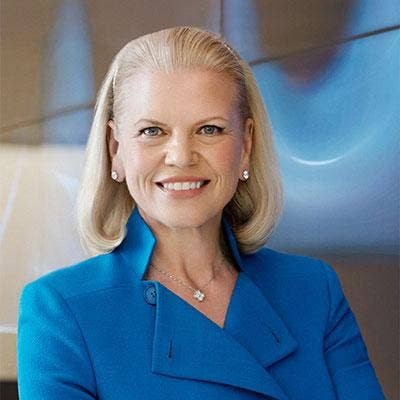
IBM
CEO: Virginia Rometty
Dec. 30, 2016: $165.99
Dec. 29, 2017: $153.42
Change: -7.57%
IBM, which has struggled through more than five years of declining sales, continued to work through a business transformation in 2017 to focus on high-margin cloud, analytics, mobile, social and security businesses. While that effort appeared to stall in the first half of 2017, its third-quarter results gave financial analysts hope that the company was on a path to resuming growth.
For the first three quarters (ended Sept. 30) of 2017, IBM reported revenue of $56.60 billion, down 2.7 percent from $58.15 billion in the first three quarters of 2016. Net income for the first three quarters of 2017 was $6.81 billion, down nearly 8 percent from $7.37 billion in the same period in 2016.
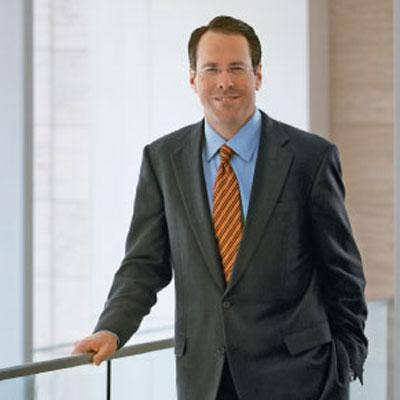
AT&T
CEO: Randall Stephenson
Dec. 30, 2016: $42.53
Dec. 29, 2017: $38.88
Change: -8.58%
AT&T's proposed $85.4 billion acquisition of global entertainment and media powerhouse Time Warner, announced in October 2016, hit a roadblock in late 2017 when the U.S. Department of Justice said it would sue AT&T challenging the acquisition.
In Decemberm, AT&T, in response to new tax laws passed by the U.S. Congress and signed by President Donald Trump, said it would increase capital spending in the U.S. in 2018 by $1 billion and provide bonuses to employees.
For the first three quarters (ended Sept. 30) of 2017, AT&T reported operating revenue of $118.87 billion, down 2.5 percent from $121.95 billion in the first three quarters of 2016. Net income for the three quarters in 2017 was $10.71 billion, down 1 percent from $10.82 billion in the same period one year before.
AT&T will announce its 2017 fourth-quarter and full-year financial results on Jan. 31.

F5 Networks
CEO: Francois Locoh-Donou
Dec. 30, 2016:$144.72
Dec. 29, 2017:$131.22
Change: -9.33%
In January F5 Networks named Francois Locoh-Donou, senior vice president and chief operating officer at networking vendor Ciena, to be the application delivery and security company's new president and CEO effective April 3. Locoh-Donou replaced longtime CEO John McAdams, who retired.
For its fiscal 2017 (ended Sept. 30), F5 Networks reported revenue of $2.09 billion, up nearly 5 percent from just under $2 billion in fiscal 2016. Net income for the year was $420.8 million, up 15 percent from $365.9 million in fiscal 2016.

Advanced Micro Devices
CEO: Lisa Su
Dec. 30, 2016: $11.34
Dec. 29, 2017: $10.28
Change: -9.35%
Chipmaker AMD's technological prowess was on display in 2017 with the chipmaker debuting impressive new products such as its Epyc 7000 series and Ryzen 7 processors. But AMD's new products weren't enough to keep investors from pushing down the value of the company's shares.
For the first three quarters (ended Sept. 30) of 2017, AMD reported revenue of $3.85 billion, up 21.5 percent from $3.17 billion in the first three quarters of 2016. The company reported an $18 million loss for the first three quarters in 2017 compared with a $446 million loss reported for the same period in 2016.
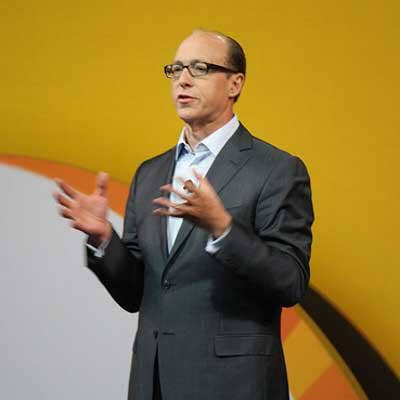
Quantum
CEO: Adalio Sanchez
Dec. 30, 2016:$6.64
Dec. 29, 2017:$5.63
Change: -15.21%
On Nov. 10 Quantum reported fiscal 2018 second quarter results that the company acknowledged were disappointing and announced that CEO Jon Gacek had left the company. Quantum named board member Adalio Sanchez, a 35-year IT industry veteran, as interim CEO.
For the first half (ended Sept. 30) of fiscal 2018, Quantum reported revenue of $223.9 million, down nearly 11 percent from $251.0 million in the first half of fiscal 2017. The company reported a loss of $11.5 million for the six-month period compared with net income of $552,000 in the same period one year earlier.
Because Quantum's stock price had languished below $1 per share since September 2015, the company announced on April 3 a 1-for-8 reverse stock split effective at the close of trading on April 18 with common stock trading on the split-adjusted basis on April 19.
The number of outstanding shares dropped from approximately 273 million to 34 million. While Quantum's stock closed at $0.83 per share on Dec. 30, 2016, that price has been adjusted this year to reflect the reverse stock split for the purpose of this analysis.

CenturyLink
CEO: Glen Post
Dec. 30, 2016: $23.78
Dec. 29, 2017: $16.68
Change: -29.86%
One year and one day after announcing the deal, CenturyLink closed its acquisition of Level 3 Communications, a global network services company, on Nov. 1 for about $34 billion in cash and stock.
On June 1, before the acquisition was completed, CenturyLink announced a CEO succession plan under which Level 3 president and CEO Jeff Storey would become CenturyLink president and chief operating officer. Glen Post will remain CenturyLink CEO until Jan. 1, 2019, when Storey will become CEO and Post will become executive chairman.
For the first three quarters (ended Sept. 30) of 2017, CenturyLink reported operating revenue of $12.33 billion, down 6 percent from $13.18 billion in the first three quarters of 2016. Net income for the first three quarters of 2017 was $272 million, down 53 percent from $584 million in the same period in 2016.
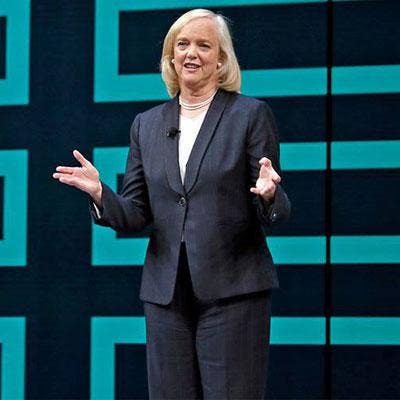
Hewlett Packard Enterprise
CEO: Meg Whitman
Dec. 30, 2016: $23.14
Dec. 29, 2017: $14.36
Change: -37.94%
Hewlett Packard Enterprise underwent some significant changes in 2017 as the company sought to remake itself. But shareholders, apparently, remained skeptical as HPE's stock declined in 2017 more than any other company on our watch list.
In April, after nearly a year of preparations, HPE spun off its Enterprise Services business, which was then merged with CSC to form DXC Technology, a new systems integration and services leader. And in September HPE completed a year-long process to spin off its enterprise software operations, including its Autonomy, Mercury Interactive and Vertica Systems products, and merge them with Micro Focus under an $8.8 billion deal.
Even as HPE was divesting its services business, it was making a series of acquisitions that strengthened its position in servers and storage. In February HPE acquired SimpliVity for $650 million, instantly boosting its competitive position in the red-hot hyper-converged systems market. In February HPE bought Niara, a startup developer of security analytics and network forensics technology, in a move to boost HPE's Aruba ClearPass network security portfolio. And in April HPE bought Nimble Storage, a developer of leading-edge flash storage systems, for $1.09 billion.
On Nov. 21 HPE announced that Meg Whitman would step down from the CEO post as of Feb. 1 with president Antonio Neri taking over the top job.
For its fiscal 2017 (ended Oct. 31), HPE reported revenue of $28.87 billion, down more than 33 percent from $30.28 billion in fiscal 2016. Net earnings for fiscal 2017 were $344 million compared with $3.16 billion in fiscal 2016.